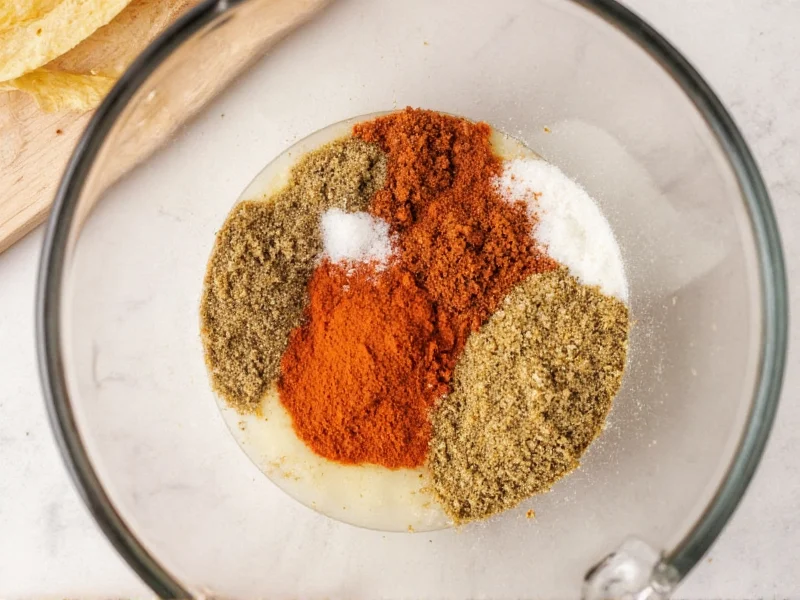Creating the perfect taco experience starts with seasoning that enhances rather than overwhelms your ingredients. While store-bought options offer convenience, understanding the components of authentic taco seasoning allows you to customize flavors to your preference and avoid unnecessary additives. This guide provides everything you need to know about crafting exceptional taco seasoning from scratch.
Understanding Taco Seasoning Fundamentals
Taco seasoning serves as the flavor foundation for your dish, working in harmony with your protein and other ingredients. Traditional Mexican seasoning relies on simple, natural spices rather than the fillers and preservatives common in commercial blends. The magic happens when these spices combine to create complex flavors that complement rather than dominate your tacos.
Core Components of Authentic Taco Seasoning
Every excellent taco seasoning blend contains these essential elements, each contributing unique flavor characteristics:
| Spice | Flavor Profile | Primary Function | Recommended Amount (per tbsp) |
|---|---|---|---|
| Chili Powder | Earthy, slightly sweet, mild heat | Base flavor and color | 2 parts |
| Cumin | Warm, nutty, earthy | Signature Mexican flavor | 1 part |
| Garlic Powder | Pungent, savory | Depth and umami | 1/2 part |
| Onion Powder | Sweet, sharp | Balance and complexity | 1/2 part |
| Paprika | Rich, slightly sweet | Color and subtle sweetness | 1/2 part |
| Dried Oregano | Herbal, slightly bitter | Traditional authenticity | 1/4 part |
| Cayenne Pepper | Sharp heat | Controlled spiciness | Pinch to 1/8 part |
Homemade vs. Store-Bought Taco Seasoning
When deciding between making your own taco seasoning or purchasing pre-made blends, consider these factors:
Homemade advantages:
- Complete control over ingredients and quality
- No anti-caking agents, preservatives, or unnecessary fillers
- Ability to customize heat level and flavor profile
- Fresher flavors (spices lose potency over time)
- Cost-effective in the long run
Store-bought considerations:
- Convenience for quick meals
- Consistent flavor profile batch to batch
- Check labels for additives like maltodextrin, silicon dioxide, or excessive salt
- Quality varies significantly between brands
Perfect Homemade Taco Seasoning Recipe
This tested recipe creates enough seasoning for approximately 1 pound of meat, yielding restaurant-quality results without artificial ingredients:
Basic Authentic Taco Seasoning Blend
- 2 tablespoons chili powder (use ancho chili powder for deeper flavor)
- 1 tablespoon ground cumin
- 1 teaspoon garlic powder
- 1 teaspoon onion powder
- 1 teaspoon smoked paprika (regular paprika works too)
- 1/2 teaspoon dried Mexican oregano (regular oregano in a pinch)
- 1/4 teaspoon cayenne pepper (adjust to taste)
- 1 teaspoon sea salt
- 1/2 teaspoon black pepper
Instructions: Combine all ingredients in a small bowl, whisking thoroughly to ensure even distribution. Store in an airtight container. Use 2-3 tablespoons of this blend per pound of ground meat.
Customizing Your Taco Seasoning
The beauty of homemade taco seasoning lies in your ability to tailor it to specific preferences or dietary needs:
Regional Variations
Mexican regional cuisines offer distinct seasoning approaches. Northern Mexico often uses simpler blends focusing on cumin and chili, while central regions incorporate more complex herb combinations. For an authentic Baja-style seasoning, reduce the cumin and increase the oregano.
Heat Level Adjustments
- Mild version: Omit cayenne completely and use sweet paprika instead of smoked
- Medium heat: Keep cayenne at 1/4 teaspoon as in the base recipe
- Extra spicy: Add 1/4 teaspoon chipotle powder along with increased cayenne
Dietary Modifications
For sodium-sensitive diets, reduce or eliminate salt and compensate with additional spices. Many commercial blends contain 300-400mg of sodium per serving, while homemade versions let you control this element precisely. For paleo or whole30 compliance, ensure your chili powder contains only ground chilies without additives.
Proper Storage Techniques
To maximize freshness and potency of your homemade taco seasoning:
- Store in an airtight glass container away from light and heat
- Label with creation date (spices maintain peak flavor for 3-6 months)
- Keep whole spices and grind them as needed for maximum freshness
- Never store near the stove or oven where heat degrades quality
For extended storage, consider freezing your spice blend in ice cube trays covered with oil, then transferring the frozen cubes to freezer bags. This technique preserves flavor for up to a year.
Common Taco Seasoning Mistakes to Avoid
Even experienced cooks make these seasoning errors that compromise taco flavor:
- Over-seasoning: Using too much blend overwhelms other ingredients. Start with 2 tablespoons per pound of meat and adjust.
- Adding seasoning too early: Add dry seasoning after partially browning meat to prevent burning spices.
- Ignoring acid balance: Finish with lime juice to brighten flavors that may become flat during cooking.
- Mixing with cold liquids: Always mix dry seasoning with a small amount of warm oil or broth before adding to meat.
- Using stale spices: Old spices lack potency, leading to bland results. Replace whole spices yearly and ground spices every 6 months.
Advanced Flavor Enhancement Techniques
Elevate your taco seasoning with these professional chef techniques:
Dry toast whole cumin seeds and other whole spices before grinding for deeper flavor. Bloom your spices in a small amount of oil before adding to meat—this technique releases essential oils and creates more complex flavor compounds. For an umami boost, add a pinch of mushroom powder or a few drops of fish sauce (which won't taste fishy but enhances overall savoriness).
Consider making small-batch variations tailored to specific proteins: a lighter blend for fish tacos, a bolder version for carne asada, and a smoky variation for vegetarian options using portobello mushrooms.











 浙公网安备
33010002000092号
浙公网安备
33010002000092号 浙B2-20120091-4
浙B2-20120091-4